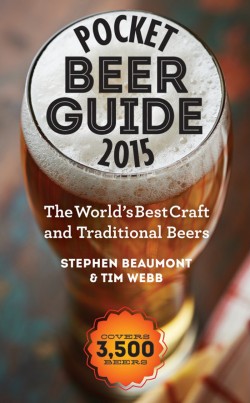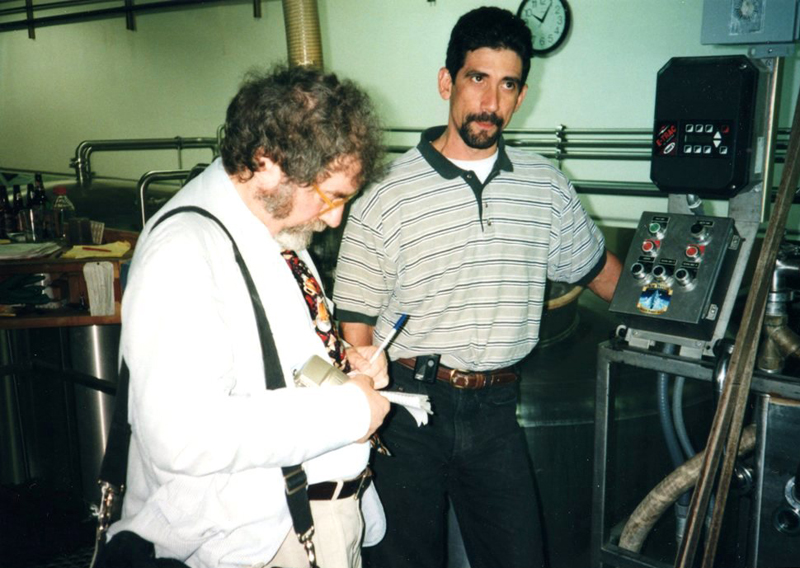Those of us who have attained a certain—well, let’s call it maturity—recall early days in the American craft era when we were confronted by bizarre “beer” that came by names like Kölsch and ESB. We were desperate to learn what all these oddities were, so we turned to experts like Michael Jackson.
“Kölsch seems to have the capacity to settle the stomach in advance, like those aperitifs based on white wine that the French favor. A brewer was once telling me that his Kölsch was good for the digestion, and I mentioned that I could see no reason why it should perform this task better than many other beers. ‘I don’t know why, either,’ he replied, ‘but you can feel it.’ He was right.”
Now we carry little computers in our pockets, and if we want to know about a beer, we just ask Siri, who tells us, “Kölsch is a local specialty beer brewed in Cologne, Germany.” In the event that you want an opinion about a particular beer—a Gaffel, say—you don’t need to dig around in your old Jacksons. Just go to BeerAdvocate, where raters agree that it is “good” (83%), and has a “straw smell with a peppery undertone” and is “a touch on the bitter side.” You can take this information in at a glance. (Jackson: “The Gaffel Kölsch is one of the driest, with a very light start, developing to dryness, then a quick spritzy finish. The dryness, almost nutty, seems to derive especially from the yeast, which is a mixed culture.”)
 Two things got me thinking about this. First, the arrival last year of the latest edition of the Pocket Beer Guide 2015 by Stephen Beaumont and Tim Webb. It is actually a continuation of a series started by Jackson himself back in the 1980s, in which Jackson attempted to catalog and rate the major beers from around the world. We’ll come to the second point in due time, but let’s consider the Pocket Guide for a moment. Before the Internet, there was no way to know which beers you’d find in a foreign country—or even in a distant state. Not only was Jackson’s work titanically comprehensive, but it also had the mark of expert authority: Gaffel Kölsch★★★ is very dry, almost nutty. (That’s from the ’94 edition, which Jackson called Pocket Guide to Beer.) It was better than Sion—two stars—but inferior to Päffgen, at three and a half.
Two things got me thinking about this. First, the arrival last year of the latest edition of the Pocket Beer Guide 2015 by Stephen Beaumont and Tim Webb. It is actually a continuation of a series started by Jackson himself back in the 1980s, in which Jackson attempted to catalog and rate the major beers from around the world. We’ll come to the second point in due time, but let’s consider the Pocket Guide for a moment. Before the Internet, there was no way to know which beers you’d find in a foreign country—or even in a distant state. Not only was Jackson’s work titanically comprehensive, but it also had the mark of expert authority: Gaffel Kölsch★★★ is very dry, almost nutty. (That’s from the ’94 edition, which Jackson called Pocket Guide to Beer.) It was better than Sion—two stars—but inferior to Päffgen, at three and a half.
But what to make of the current Pocket Guide? Webb and Beaumont rate even more beers—but far fewer than are available on BeerAdvocate and RateBeer. And they offer their opinions as well—along with Jackson’s old star rating system, with a white star standing in as a half star. (“Gaffel Kölsch★★☆ is oft-derided as too-commercial a brand … but its hop-forward, aromatic and only marginally fruity character make it worth a visit.”) But why should we care what they think? The only reason is if you value expert opinion. Everyone’s got an opinion, though—Beaumont and Webb often disagree with Jackson—so why not just go to RateBeer?
This brings us to the second thing. A local beer educator in Oregon, Bill Schneller, recently posted this to Facebook:
“Found a beer today from Burton Bridge Brewery called Olde Expensive Ale. Did some research on it and saw a bunch of people complaining that it’s over carbonated, sour, ‘off,’ etc. Yet, none of the ‘geniuses’ on Beer Advocate or Rate Beer mention the overwhelming Brett in the aroma. Yes, it’s a traditional Olde Ale with Brett (and nicely done at that), but read the popular beer sites and no one picks it up. As a beer educator, it’s irksome to see such popular sites with their supposed resident beer ‘geniuses’ who still can’t pick up basic flavors. Sigh …”
It is characteristic of this moment in American history that we hold experts in contempt and valorize the global hive mind. Critics are vanishing faster than tropical reefs, and we now rely on sites like Yelp and Good Reads and Amazon to tell us what to buy or read or patronize. There are many reasons why these sites have made us better consumers and, in some cases, better-educated. But the hive mind has a tendency to elevate mass opinion and codify conventional wisdom (even when that “wisdom” is grossly errant). The phenomenon is so pernicious it can even infect non-crowd-sourced information. If you trusted BeerAdvocate with the authority to decide on Burton Bridge’s Olde Expensive, you’d have been sent down a blind alley.
There are people who know a lot more about beer than you. I’ve been writing about beer for nearly two decades, but learned humility when I started intensively interviewing brewers for my forthcoming book. I had the pleasure of sitting in on tasting panels at breweries and watch as trained tasters rattled off compounds so subtle I couldn’t locate them even when I knew they were there. I spoke to brewers who can identify the fingerprints of process on beer like decoction mashing or secondary fermentations or even lagering times. I read the work of historians who have, over the past decade, studied brewing logs and historical sources and rewritten the history of brewing. All these people knew and still know a lot more than I, but in my exposure, I’ve learned a lot, too.

Michael Jackson with Tony Gomes, a brewer at the now-defunct Saxer Brewing in Portland, in 1998. Photo by Jeff Alworth.
Not every expert will have spent the time to absorb all this information, but some have. A good expert opinion will draw on several threads of information—science, process, history and culture—and bring all of that knowledge to the discussion of a beer. But because we now have 900 reviews of a beer on a ratings site, it seems superfluous. It looks like we haven’t lost anything by trading in a Michael Jackson for a RateBeer; both bird-dog the good beers to seek. But experts have a more complete picture. They instantly recognize the aroma of Brettanomcyes and recognize its effect on a beer. They know the history of beer and understand why a brewery would put it in an old ale. Writing or teaching about it, an expert would explain this and point out the telltale sensory signals—and the novice would walk away with a template for understanding what she was tasting.
Why should you bother seeking out an expert? Because beer experts do some things even 900 laymen together can’t. It’s alluring to just click a couple of buttons on your phone and have an apparently authoritative rating appear (I read BeerAdvocate, too!), but it’s also critical to recognize what that number can’t tell you.
Read more posts from The Beer Bible Blog.
Jeff Alworth is the author of the forthcoming book, The Beer Bible (Workman, 2015). Follow him on Twitter or find him at his blog, Beervana.

I think it’s pretty common knowledge that RateBeer and that other website are by and for amateurs. You really shouldn’t be turning to those sites for “expert” insight (that’s not to say experts don’t use the site, but they’re in the minority).
People have a tendency to trust the opinion of those whose knowledge levels match or exceed their own. If you’re a beer expert, or just a hardcore enthusiast, you’re more likely to trust the opinion of an established expert than surf over to RB or BA to see what the hive thinks. It works the same way in other genres: if you’re a movie buff you’ll read Roger Ebert, you don’t just go to Rotten Tomatoes. If you’re a foodie you read your resident food critic, you don’t just go to Yelp.
Hive reviews are based mostly on individual experiences – all criteria be damned. If one person had a bad experience with one product one time, it’s not indicative that all people using that product will have a similar experience every time. Hive reviews are interesting to read to see how different people can react to the same product differently, but it should be understood by now that they’re not very reliable sources of accurate information or in-depth critiques.
Neither one nor the other. I tend not to trust the opinion of anyone I don’t know well enough. And there’s no bigger expert on my taste than myself.
Hi Max, that makes you an island of insularity if all you do is compare beer with your tastes, what about empathy with other tastes; what about music, I struggled with a lot of Benjamin Britten’s music for years, but finally began to understand it, it’s the same with gueuze, if I had gone on my first tasting of gueuze I would not have written reams of notes about the ode to joy that is Parfait Mariage when I had it in a bar in Ghent a few year back.
I dunno, ATJ. I am more like Max. I am too Protestant for that. I make my own deal. I had to undertake sour beer studies structured for myself based on the readings of others, yes, but more the drinking of things for and by myself. Time not tutelage was key – and after years I am a novice. Yet I know more than many self-appointed experts. http://beerblog.genx40.com/tag/sourbeerstudies
I also think it is important to find an expert with similar tastes as yours if you want some trustworthy advice that matches your palate. Just like the wine industry, ratings mean very little unless you enjoy similar wines that the rater does.
As a teenager, my choice of beer was limited to whatever the homeless man that was buying it for me chose. When I was finally legally able to buy beer, I had so many options. Beer Advocate was useful for learning about different styles. I appreciated the write-ups by the Alstrom brothers. However, I can’t stand what BA has become. Its like a penis measuring contest. The biggest, hoppiest, weirdest, rarest beers will score high. Everything else will be mediocre. To make things worse, there are brewers that obsess over BA and RB ratings and brew these overpriced special release beers that people wait hours in line fore. I trust my own tastes as well, but I love to hear from brewers and folks like Jeff. To me its all about context.
Expert or social media, I don’t use either to judge whether I will drink a beer. I will try anything at least once and decide for myself if I like it or not.